-
Joining a new company as a leader is tricky and sometimes it does feel like stepping into chaos.
There's so much for you to process – new people, culture, challenges, expectations, competing and unclear priorities and pressure to deliver results.
I like to slow it down. I don't try to fix everything on day one. I focus on the context, the big picture first, understand the team and what they need my help with. Once I get where we are going and why, I can focus on the culture and processes to get to the destination faster with stronger teams.
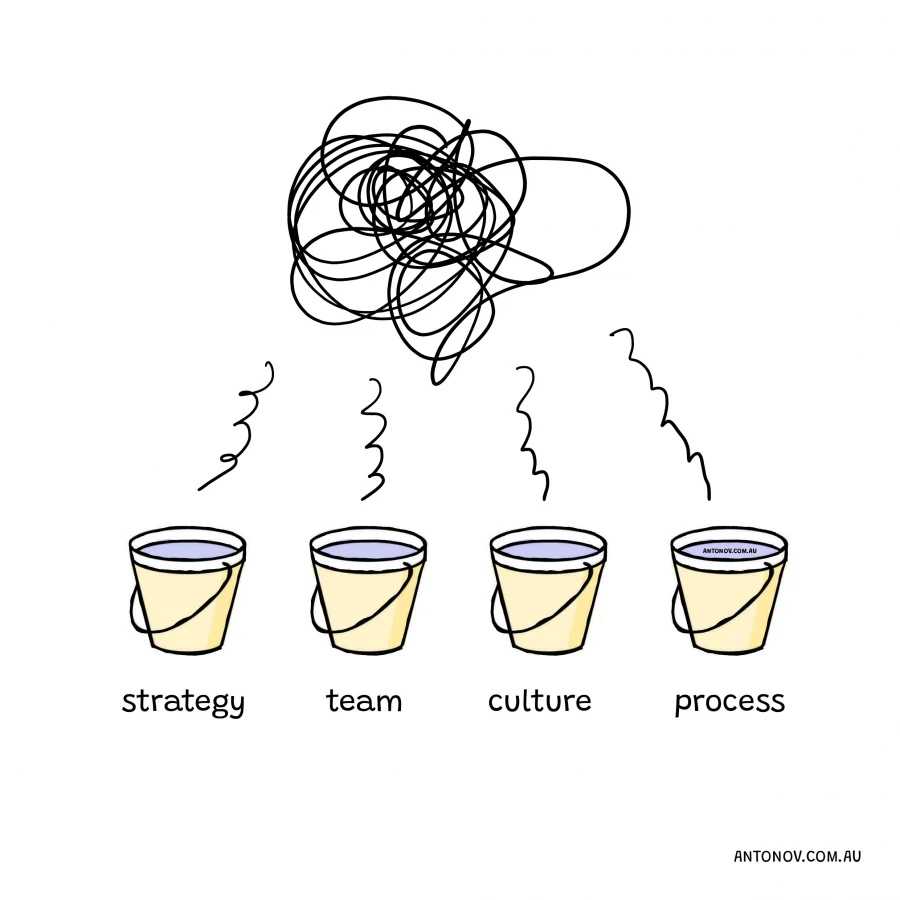
-
It's crazy how many leaders don't know much about their team. They are not curious about their motivations or aspirations, not only professionally but also on a personal level.
Get to know your team. What are their hobbies? What are they exploring? How are their families? Where are they planning their next trip? What are they watching? What are they reading?
Make it a weekly session. It takes just half an hour but builds a much stronger connection. This is important. Stronger connection = more trust. More trust = better feedback, better communication, higher quality of work and more motivation. -
Emily Kramer - The Death of Marketing Channels
📘 Most marketers are solving the wrong problem. You don't need a new channel. You need to know what makes you different. When you figure that out, the rest gets simple.
📘 The conversation tackles the ... Read more -
Set the Tone
Push others. Push yourself harder.
High standards beat perfection. They beat pressure. They are built on one thing - refusing to let average settle in.
Raise the Bar Around You
Call it out when your peers drift. Remind them what great looks like. Challenge your boss to reach higher. Hold the mirror up. Then hold yourself to an even sharper edge. Show them what it means to care - about the work, the craft, the outcome.
Build Incrementally
Pick one standard. Nail it. Then raise another. Layer it like muscle. Burnout comes from trying to change everything at once. Strength comes from building it piece by piece.
Quiet Consistency Wins
High standards are not loud. They are lived.
Patience wins. But only if you refuse to lower the bar while you wait.
Kindness Isn't Compliance
Most people confuse kindness with acceptance. Being kind doesn't mean tolerating mediocrity. Great teams grow because someone had the courage to raise the standard when it was easier to stay quiet.
Watch Out for “Good Enough”
Average is always looking for a way back in. It hides in phrases like “good enough” or “we'll fix it later.” Kill that thinking. Make high standards the default - not the exception.
Lead By Example
Start small. One line of copy. One slide. One handover doc. Show the difference. Set the bar by example. Then hold the line. Hold it when no one's watching. Hold it when others let it slip.
Make Quality Contagious
That's how you lead without the title. That's how you make quality contagious.
High standards are built in silence. But their results speak loud. -
The concept of a Trust Battery is that it typically starts at 50% and then every interaction charges or drains the trust battery.
It's interesting how, once you pass a certain percentage - let's say 80% (mind you, it's a bit abstract) - on the other person's Trust Battery, a shift happens. Walls drop. And suddenly the next level of collaboration unlocks.
Love these moments. -
Progress motivates action. It's not just the reward; it's the feeling of progress that drives commitment.
Two groups of customers were given punch cards awarding a free car wash once the cards were fully punched. One group was given a blank punch card with eight squares; the other was given a punch card with ten squares that came with two free punches. Both groups still had to purchase eight car washes to receive a free wash; however, the second group of customers - those that were given two free punches - had a staggering 82 percent higher completion rate.
Hooked: How to Build Habit-Forming Products -
Most engagement surveys don't measure engagement.
They measure vibes.
The problem isn't the intent - it's the output. You run a survey. You get a 67.8% “engagement score.” Someone builds a deck. Charts go up, comments stay anonymous, nothing changes.
That number doesn't tell you who's struggling. It doesn't tell you why trust is low. It doesn't tell you where the rot is starting. It just tells you people clicked a box.
Real engagement isn't a metric. It's a conversation.
Ask them how they're feeling. Ask what's blocking them. Ask what's making their work better - or worse. Then shut up and listen. Not just in surveys. In 1:1s. In retros. In offhand comments. The signal's already there. You don't need a dashboard. You need ears.
Pie charts don't build trust. Conversations do. -
Success comes from repeating the right words, not just saying them once.

-
Misalignment is one of the most common (and costly) issues in product development, project planning and team collaboration. Whether it's about the problem you're solving, the solution you're building or simply the language you're using, assumptions often go unnoticed until it's too late.
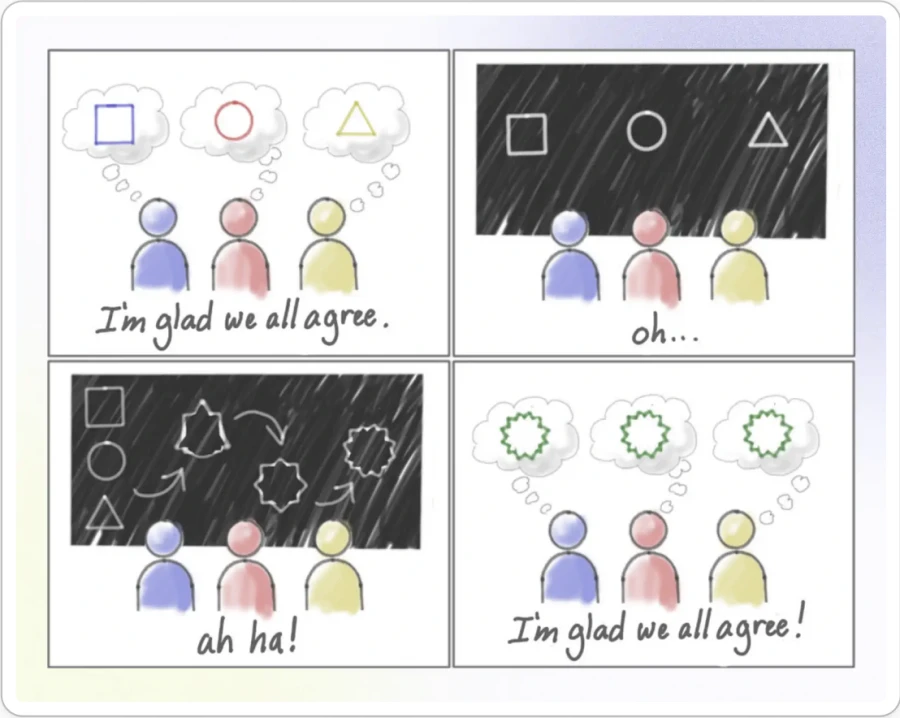
Who This Is For
- Product Managers, Product Designers, engineers and team leads who are struggling with unclear priorities or conflicting understandings.
- Anyone working in cross-functional teams who wants to reduce rework, missed expectations and confusion.
Common Questions This Addresses
- “Why does everyone think we agreed, but we all had different ideas?”
- “How can I surface misalignment before it causes delays?”
- “What's the fastest way to get everyone on the same page?”
Why Writing Down Your Thinking Matters
1. Surface Hidden Assumptions
People often agree verbally, but are visualising completely different things. Putting ideas into writing reveals these mismatches early.
2. Create Shared Understanding
Writing clarifies your own thinking and gives others something concrete to react to, challenge, and align with.
3. Enable Asynchronous Collaboration
Not everyone is in the same room or timezone. A written artefact (like a user story map or brief) allows everyone to engage in their own time.
4. Reduce Future Friction
What feels like a tiny misunderstanding today can snowball into big problems later. Written alignment now prevents costly rework down the line.
Practical Tip: Use User Story Mapping
User story mapping is a collaborative visual exercise that helps teams define the user journey and prioritise features. More than just a diagram, it's a tool to:- Capture what users are trying to achieve
- Break down features into meaningful slices
- Highlight disagreements early
How to Start
- Write it down. Even a rough sketch or bullet list is better than nothing.
- Invite collaboration. Ask others to review, question, and contribute.
- Don't assume agreement. Check for true understanding, not just nodding heads.
If no one has written it down yet, that's your cue. Misalignment loves ambiguity. Writing brings clarity and saves time, money, and trust later.
Document early. Share often. Align before you act. -
There are two types of product teams - the slow-learning and the fast-learning.
The slow-learning team wants to deliver. They manage projects, write tickets, attend internal meetings and ask colleagues for design feedback. They mostly care about delivery and managing expectations.
The fast-learning team wants to learn. They talk to customers, read market news, push hacky code to production, and sometimes break things. They embrace ambiguity, but they learn fast.
The difference? The slow-learning team builds products for their bosses, and the fast-learning team builds products customers actually need.
Shift your focus. The best products come from deep insight, not just efficient delivery. -
Recently I wrote about the most important skill for Product Managers.
Regardless of whether you are a Product Manager or not, the communication will help you with all aspects of your career. If you want to manage or be a leader, you have to be a good communicator. Specifically, you need to get better at framing.
What's your goal? Are you looking for feedback, sharing information, wanting to influence, asking for approval or something else entirely?
What are you sharing? Is it a problem? Maybe a solution? A vision? Or a mix?
How much detail are you planning to share? Is this a helicopter or detailed view? Or perhapse, both?
Who's your audience? Your team, the entire organisation or the executive group?
Your communication needs to be adjusted depending on the answers.
Early in your career, you use the same message no matter the context.
To grow, you need to get better at tailoring your message - what you say, how you say it and when to say it. -
Misaligned leadership doesn't announce itself. It creeps in. Slowly. Quietly. Then it wrecks your team.
Leaders think the damage is minor. Temporary. Invisible. But it's not. It's heavy. It's real. It shows up in whisper networks, in backchannel Slacks, in passive standups where nobody commits because no one knows where things are going.
You see it when smart people play it safe. When the loudest voice wins. When meetings drag on because no one wants to be the first to say what everyone's thinking. You feel it in the hesitation. That's the real killer.
Disagreement isn't the problem. Lack of alignment isn't even the real issue. Teams can live with that. What they can't survive is hesitation. Leaders who won't commit. Who won't decide. Who stay neutral until it's too late and now the team's solving the wrong problem. Again.
Indecision isn't neutral. It's destructive. Especially when disguised as “consensus-building” or “being thoughtful.” Teams need a decision. Even the wrong one. Because wrong moves can be corrected. Hesitation can't.
Leaders, pick a path. Say it out loud. Then stand behind it until you know it needs to change.
Make the fucking decision. Your team's already waiting.
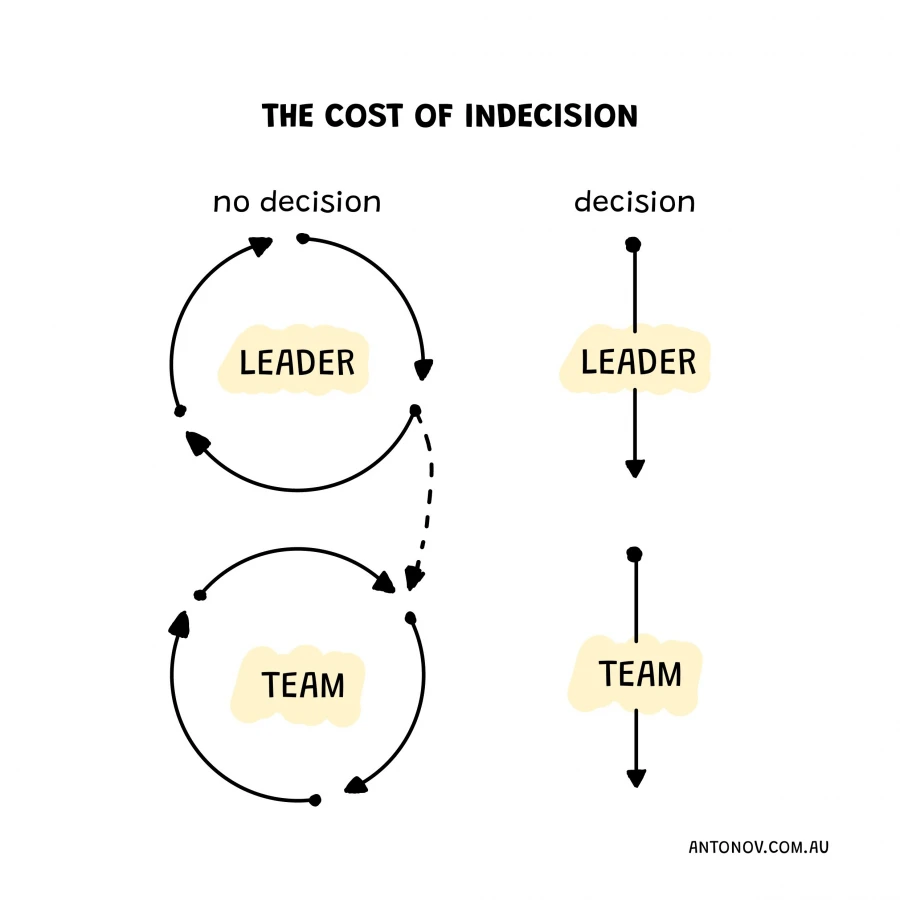
-
Trust breaks when promises break. People notice, even in silence and they remember. Honour commitments - trust depends on it.
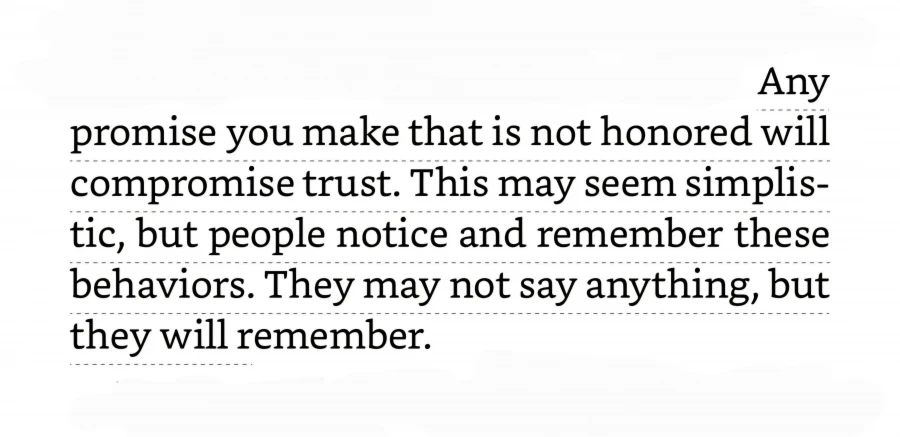
-
This afternoon I spoke with the team about the challenges for any leader and their team in finding the balance between telling them what/how to do (Directive Leadership) and letting the team figure it out themselves, make some mistakes and learn (Empowering Leadership).
The balance is hard.
You definitely wouldn't want to over-index on either side. So you've got to find a sweet spot.
But it also could be multidimensional, and the balance might shift depending on the area.
For example, you might want to give more direction in terms of the problem the team is solving compared to how the problem is solved. Or you might want to give less direction in the team's communication style but more direction in terms of the standards of produced work.
Regardless, it might be helpful to be open about that balance and have a regular conversation about it.
Because that balance isn't static either. As the team gets better and better, it requires you to adjust the balance.
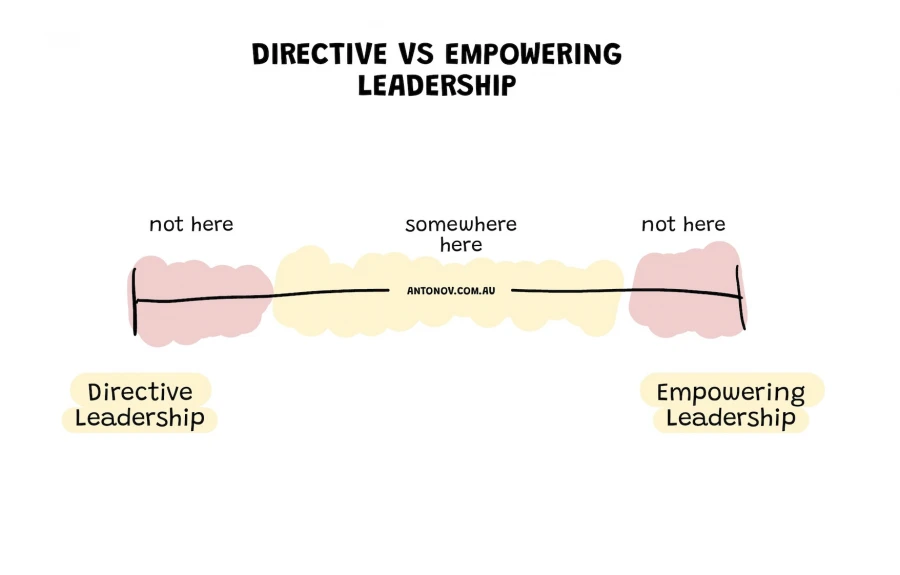
-
When your team isn't experimenting enough, it's most likely due to experiments taking too long to build, track and measure.
But every missed experiment is a missed opportunity. Insights go untapped. Ideas remain untested. Innovation stalls.
If the bottleneck is tech, hack it. Find workarounds even at the cost of degrading user experience but push forward.
Constraints spark the best solutions. -
Currently refreshing my memory on Radical Candor by Kim Scott. These quotes are amazing:
The best way to keep superstars happy is to challenge them and make sure they are constantly learning.
And the polar opposite:
As you probably know, for every piece of subpar work you accept, for every missed deadline you let slip, you begin to feel resentment and then anger. You no longer just think the work is bad: you think the person is bad. This makes it harder to have an even-keeled conversation. You start to avoid talking to the person at all.
As a leader, it can get very tough. Or at least it might seem that way. You might have the most amazing relationship with your direct report; you might even call it friendship. But if the person doesn't perform, you have to address it.
And the solutuion is actually quite obvious….you have to call it out and address it as it's your direct responsibility as a manager. And if you consider yourself a friend as well.
The alternative is all downsides: you're not doing your job, you're not helping your friend by denying them an opportunity to learn and you're also dropping the team standards.
Your team operates at its weakest link and helping that person helps everyone.
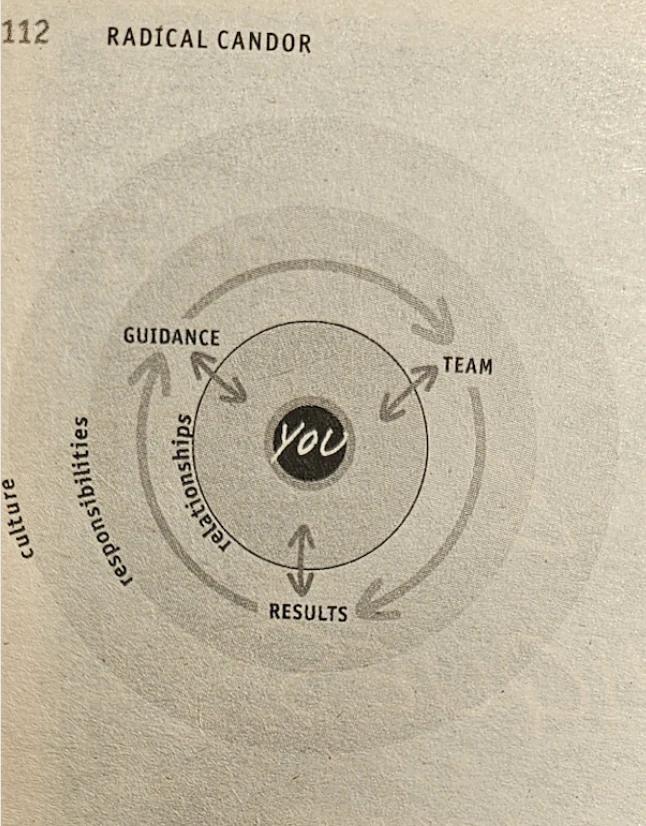
-
Most people think leadership is about control. They assume great leaders are the ones who tell people what to do, make all the calls and keep everyone in line.
That's outdated thinking.
The best leaders don't control. They share context & intent, inspire, empower and trust their teams to make mistakes.
Control stifles. Trust unleashes potential. -
Bad leaders like convenience over value.
They push those who make their lives easier - small tasks, fire drills and ego bosts. Problem solvers, whose work eliminates chaos, go unnoticed because their success erases the memory of the problem itself.
Leaders fear losing their “firefighters” more than those who ensure a fire never starts. The latter rarely gets rewarded. -
Product Managers own the full lifecycle - strategy, discovery and delivery. Product Owners focus narrowly on Agile delivery. Splitting these roles fragments accountability and muddies product development.
True impact comes from roles with full ownership. -
A strategy isn't about looking smart. It's about making sure everyone understands it.
Clarity beats complexity in any organisation. A strategy packed with jargon or overblown ideas creates confusion, not action. The goal is alignment - getting everyone moving in the same direction with confidence.
Simple, clear strategies win because they get executed.
